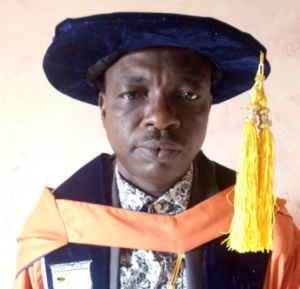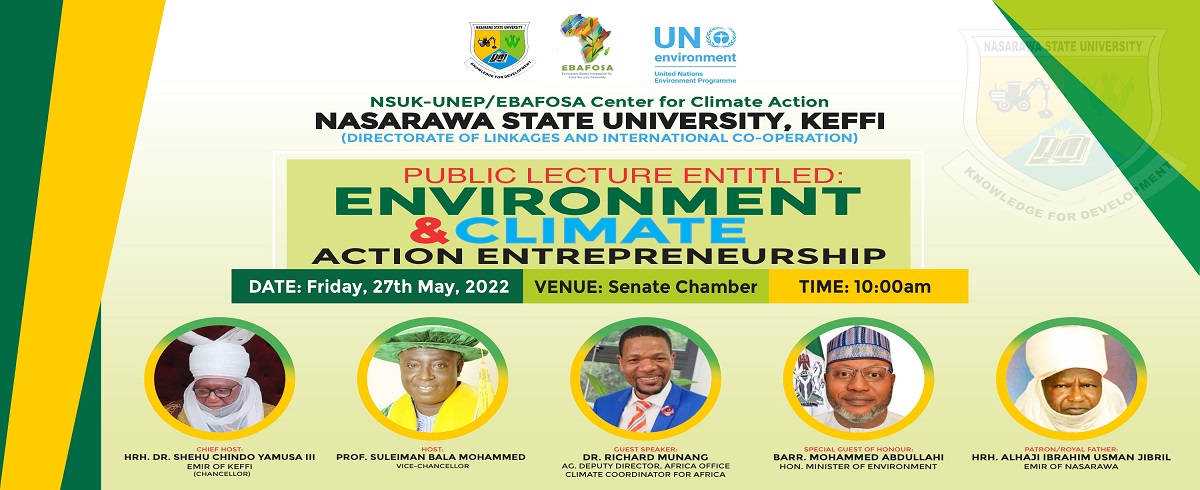
Dean
The repositioning of Agriculture as the key and sustainable driver of our national economy requires the evolution of curricula that will equip students with necessary skills required to engage them as active players in the agricultural value chain and in conformity with National goals as guided by regulatory bodies like the National University Commission (NUC) minimum standard of training and the Nasarawa State University’s vision.
Agriculture is by far the most important of the world economic activities. Yet, the study of agriculture receives relatively little attention from youths. This is an attempt to provide young people with a good knowledge of the basic principles and techniques of Agriculture and the motivation with which they can translate this knowledge into real improvement in agricultural productivity as a means of their livelihood and self employment..
The establishment of Faculty of Agriculture and the siting of same in Lafia to collaborate with the College of Agriculture Lafia is a bold institutional arrangement for agricultural research, training and extension that could rapidly transform farmers’ skills in agricultural production, harvesting, post-harvesting technology, utilization and marketing. It is envisaged that it would further empower the state to become the largest exporter of food to other states and beyond.
The Faculty of Agriculture of Nasarawa State University started with five academic Departments as follows:
- Department of Agricultural Economics and Extension
- Department of Agronomy (Crop Production and Soil Science)
- Department of Animal Science
- Department of Forestry, Wildlife and Fisheries
- Department of Home Science and Management (with options in Food and Home Science, clothing and Textiles and Nutrition and Dietetics)
At the inception of the University (February, 2002) one of the mandates was to establish Faculty of Agriculture. A team of experts in various field of Agriculture from the University of Agriculture Abeokuta (UNAAB) was invited to conduct a feasibility study and on the spot assessment of available facilities for the establishment of the Faculty of Agriculture in Lafia. The team of consultants carried out their assessment between 30th June and 5th June, 2002.
The report submitted by the team of experts reasoned and concluded that the take-off of the Faculty of Agriculture in Lafia during 2002/2003 academic session (a session behind the take off of the University was feasible. The experts report highlighted essential facilities and other supportive actions that would enhance the smooth takeoff of the Faculty. The Faculty started in 2002/2003 academic session with twelve (12) students admitted into its 100 level at Keffi. Movement to Lafia as a tenant within the College of Agriculture (COAL) took place in January, 2004 to commence the 2003/2004 academic session with twelve (12) 200 level students, five (5) academic staff and five (5) non-academic staff and 27 non-academic staff.
During the phase I of the Faculty’s development plan (2002/2003-2008), the Faculty intends to develop fully Departments recommended by the team of consultants. At the phase 2, it is envisaged that these sub programmes will evolve into specialized Departments; these are:
(i) Department of Agricultural Economics and Extension
(ii) Department of Agronomy (Crop and Soil Science
(iii) Department of Animal Science
(iv) Department of Forestry, Wildlife and fisheries
(v) Department of Home Science and Management
These five Departments would service four (4) academic programmes listed below through joint courses and practicals.
- Agriculture (with options in Agricultural Economics and Extension, Agronomny and Animal Science
- Forestry and Wildlife
- Fisheries
- Home Science and Management (with options in Food and Home Science, clothing and Textiles and Nutrition and Dietetics)
With this multidisciplinary approach, the undergraduate programme of the Faculty is aimed at the following.
- Offer a broad training in agriculture with sufficient practical component that would make the graduates to be self-confident to engage in post-graduation self employment rather than being job seekers.
- Enhance students understanding of the role of Agriculture (production, processing, storage, preservation and consumption) in transforming Nigeria into food fiber self reliant and self-sufficient country
- Emphasize production-oriented practical skills in farm production and management through a combination of production-oriented courses.
- Internships and village based attachment to small-scale medium scale and large scale farmers.
- Ensure a strong solid foundation in the respective medium-scale and large-scale farmers.
- Ensure a strong solid foundation in the respective disciplines in the academic Departments.
- Transform the students at the end of their graduation into truly learned members of the 21st century Nigerians Society with mature mental attitude and rational minds capable of making enquiries on issues that affect our corporate existence as a nation.
The basic philosophy of Faculty of Agriculture, Nasarawa State University is to significantly contribute to the democratization and liberation of scientific agriculture in Nigeria so that the fruits of scientific agriculture be made available and accessible to the rural farmers. That is, research activities in the Faculty would be so designed to address priority problems confronting Nigerian agriculture. The research scientists in the Faculty would be encouraged to work on research problems that have practical relevance to local farmers. Local farming communities in the state must be able to reap substantially from the fruit of agricultural research. This means that the communication gap between researchers and the farmers must be bridged by having cordial and efficient working relationship with the state ADP. The Faculty of Agriculture, Nasarawa State University intends to move beyond turning out trained Agricultural Scientists but have a major role in agricultural extension and engage in collaboration with the ADPs to assume responsibility for
- Training of extension staff
- Diagnostic survey
- On-farm adaptive research (OFAR)
- Monthly Technology Review Meetings (MTRM)
- Fortnightly Training Sessions FNTs)
- Collaboration with the Agricultural Extension and Research Liaison Services AERLS) and;
- Collaborate with the local and international Agricultural outfits and Research Institutes.
The philosophy, mission and mandate of this Faculty is also to transform very rapidly farmers skills in agricultural production, harvesting, post-harvest technology, utilization and marketing. This would invariably lead to the enhancement of incomes and quality of life of the ordinary farmers especially the catchments area of the University.
For the Bachelor of Agriculture, all the students offer the same courses from 100 to 400 level while the 500 level (fifth year) is reserved for students to have some modicum of specialization in any of the programmes mentioned above.
The first year of the B. Agric., B. Fisheries, and B. forestry and Wildlife as well as B.Sc. Home Science and Management programme is devoted to the study of the basic sciences. The second and the third years (200-300 level) are spent acquiring practical and theoretical knowledge through the media of lectures, laboratory practicals, farm visits and farm practice in all the subjects of Agriculture.
The Faculty of Agriculture has the mandate for teaching, research and community service. Over the years, it has been able to turn out graduates with requisite skills and cognate experience who are doing well in their chosen fields of study. Giant strides in Groundbreaking Researches too numerous to mention have also been made. Findings from such research work have been published in highly reputable international journals with high impact factors to increase the visibility and world ranking of this great university, and project Nasarawa State in a good light.
The Faculty has to its credit some local and international grants/aids to advance research geared towards the betterment of humanity. These include amongst others 1). Assessment, Development and Conservation of appropriate soil management strategies for securing long-term productivity in Southern Guinea Savannah of Nigeria. A project implemented under the competitive Agricultural Research Grant Scheme ARCN/CARGS, Nigeria. 2) Bioconversion of Agricultural wastes to value added ruminant feeds using white rot fungi (ARCN/CARGS RFA). 3) Alleviating poverty through sustainable improved rural chicken production in Nasarawa State, Nigeria sponsored by TETFUND, Abuja. 4) African Chicken Genetic Gains (ACGG), sponsored by Bill and Melinda Gates Foundation, USA and 4) Capacity Advancement for the Nigeria node of GBIF, National Data Mobilization Plan, sponsored by Biodiversity Information for Development (BID) of the European Union, Austria.
With regard to National and International professional assignments, the expertise of some staff of the Faculty is/was sought in: 1) The development of Soil Information Systems for Nigeria through digitization and archiving of legacy soil data, FAO/NSPFS, 2005-Date. 2) Geo-Spatial Variability of Soil properties in collaboration with IITA Geo Spatial Lab., 2013-14. 3) Fertility Testing and Evaluation in Northern States of Kano, Niger and Kogi States, Third National Fadama Development Project (Fadama – III AF). 4) Preparation of the country’s progress report on the ‘Implementation of the global plan of action for animal genetic resources – 2014 to 2019’ submitted to FAO, Rome. 5) Drafting of ‘African Sustainable Livestock 2050: The future of livestock in Nigeria. Opportunities and challenges in the face of uncertainty’ by FAO, Rome, Italy, 2018 and 6) Representation in the national committee for the implementation of the partnership for control of Aflatoxin in Africa (PACA) pilot project of the Africa Union commission. 7) Implementation of Yam Improvement for Incomes and Food Security in West Africa (YIIFSWA)/IITA/AFD project in 70 farming communities in Nasarawa State.
The Faculty has also been able to impact on its immediate community especially Shabu, Danka Sarki and Kwandere through various trainings on soap and textile making, nutrition and dietetics, fish and poultry production and Good Agronomic Practices for soil and crops.
The Faculty has won many local and international laurels including the hosting rights for World Soil Day by FAO in 2017 and 2018; Fish Technology Development 3rd place award at the 2019 National Agricultural Show in Karu, Nasarawa State. It is also a two-time winner of the Annual Research and Publication Fair of the Nasarawa State University (2014/2015 and 2018/2019 Sessions and Second in 2017/18 session).
The practical aspect of the Degree in the Faculty aims at impacting in students a production-oriented approach to farming and affords students the opportunity to appreciate the practical production and management problems and their solutions in running a farm as an enterprise. All 200-400 students participate in field practical training. At 200 and 300 level, students work in groups and each group is assigned a production unit (crop and animal) in the students Teaching Farm. The practical work goes alongside course work.
The 400 level is the practical year during which period students in B. Agric., B. Forestry and Wildlife and B. Fisheries programmes do not take any course work but are totally engaged in the farm. For example each student, aiming at any of three options of B. Agric degree is allocated 0.25ha of farm land to cultivate at least six different crops on ‘start to finish’ approach during the rainy semester (April to September). For the animal components, also during the practical year, one group of four students is assigned some livestock (2 breeding rabbits, 20 broilers, 1-2 sow units, or 10 layers) to manage from day one to market. Students are engaged at the animal section during the harmattan semester (October-March). The academic and Senior Technical Officers of the Faculty give necessary guidance to students.
Staff Profile
| Name | Portfolio | |
|---|---|---|
| ------------------------------------- | Dean | |
| Deputy Dean | ||
| Faculty Exam Officer | facagrexam@nsuk.edu.ng | |
Upcoming Workshop/Conferences


